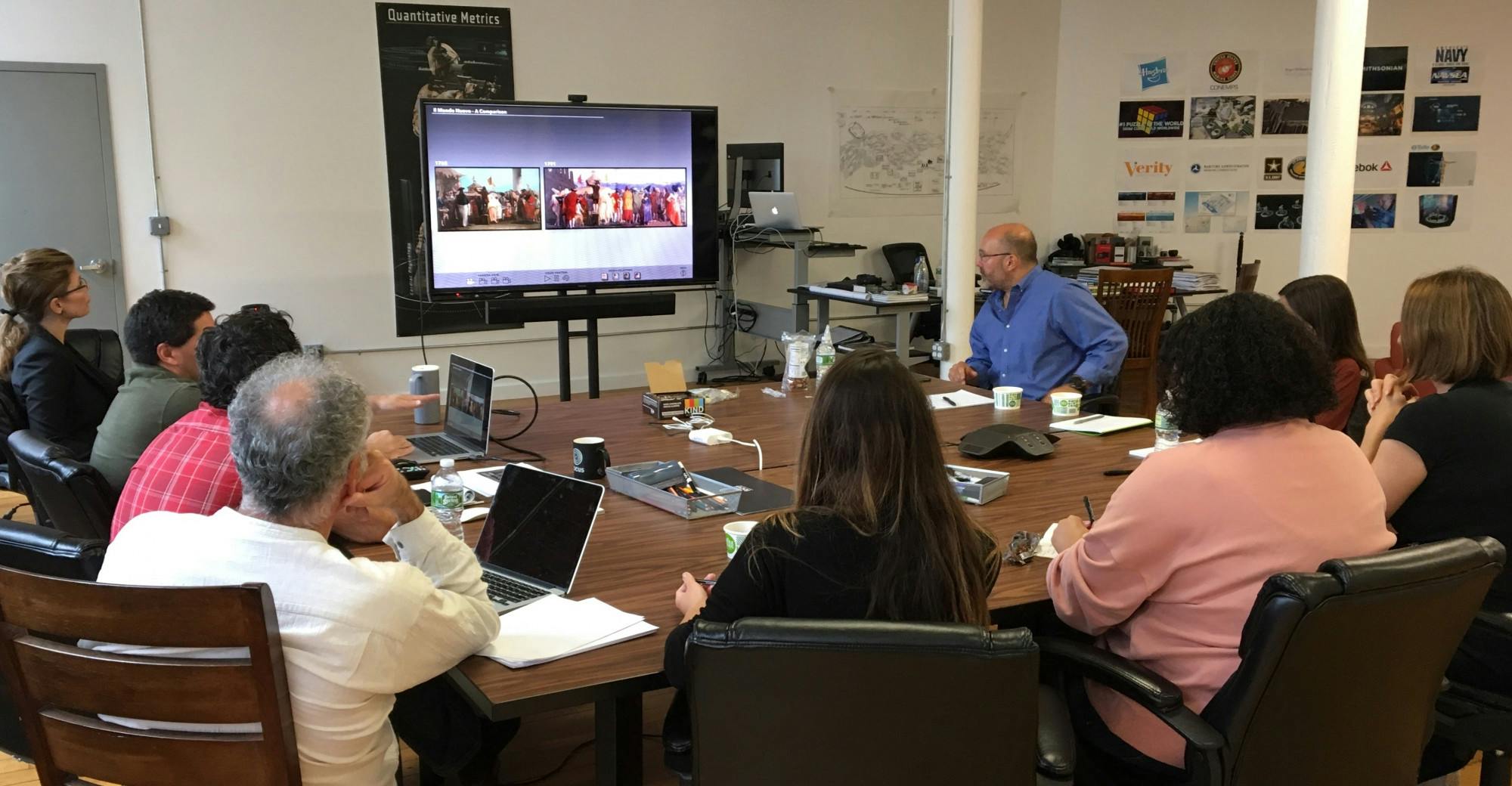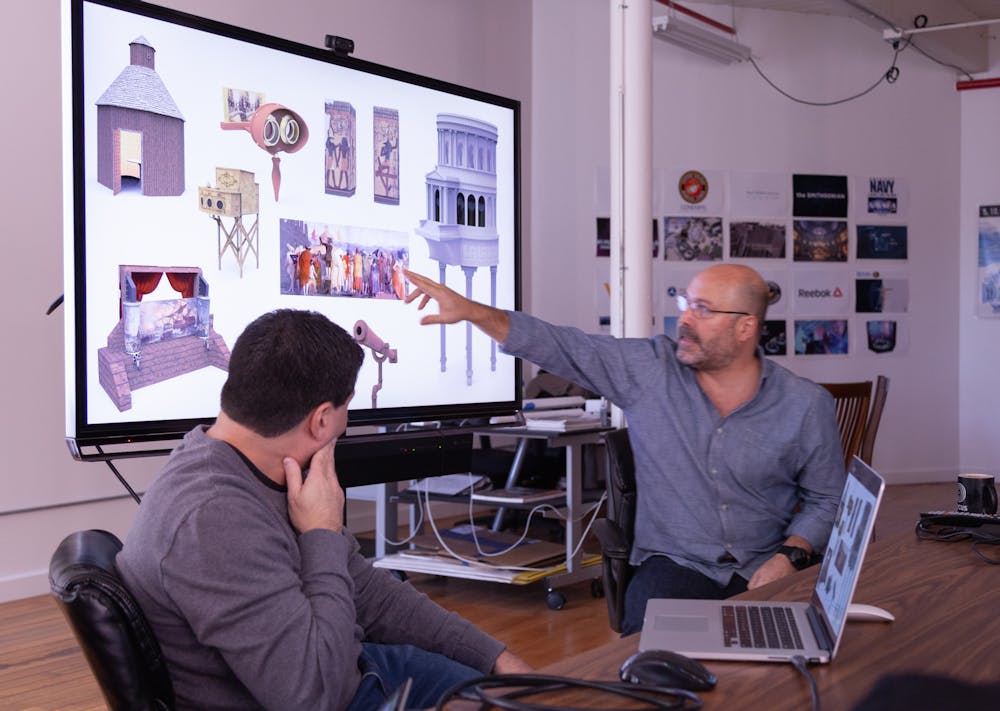Virtual reality devices have taken gaming and entertainment communities by storm in recent years, but the phenomenon isn’t entirely new. Massimo Riva, professor of Italian studies and affiliated professor of modern culture and media, explored “the long history of the timeless human aspiration to reproduce the world we live in” in his award-winning digital publication.
In “Shadow Plays: Virtual Realities in an Analog World,” which was published last year, Riva looked at analog instruments in 18th- and 19th-century Italy that allowed people to observe simulations of the world as a precursor to virtual reality devices today.
On Feb. 8, “Shadow Plays” was honored with a Professional and Scholarly Excellence award from the Association of American Publishers in the category of eProducts.
The project, which was a collaborative effort between Riva, Brown University Digital Publications and Stanford University Press, took over six years to complete. It highlights analog entertainment devices and discusses themes of “virtual travel, social surveillance and utopian imagination,” according to the project.
From optical devices such as Tiepolo’s cosmorama or Casanova’s polemoscope to art pieces like the painting “Mondo Nuovo” or Garibaldi’s Panorama, “Shadow Plays” gives viewers a closer look at the art and science that influenced many of today’s innovations in augmented, extended and virtual reality.

Professor Massimo Riva and members of the design team discuss the development of interactive simulations for Shadow Plays.
Courtesy of Ben Tyler
According to Riva, the idea of “Shadow Plays” began in 2015. In the decade prior, Riva had become interested in historical inventions that allowed viewers to observe simulations of the world around them.
“I’m fascinated by all the different ways by which artists in particular have created optical illusions in the past and how, as a result, we’ve reached the point today where we are living in a virtual world of sorts,” Riva told The Herald.
This phenomenon, which Riva calls “virtual realism,” is “marked by the virtualization of the real and the realization of the virtual,” according to the publication.
When Digital Publications put out a call for project submissions in 2016, Riva brought his idea forward. Over the course of the next six years, Riva worked with Digital Publications, crafting a website that showcased the structure and function of these early inventions and forms of media. The team also collaborated with Digital Publications Designer Crystal Brusch and local studios Focus Vision Media, based in Pawtucket, and Studio Rainwater, based in East Providence, to design the interactive and three-dimensional elements of the website.
The project was published in June 2022 by SUP. According to Jasmine Mulliken, production and preservation manager for Digital Projects at SUP, the publisher’s role looked very different for “Shadow Plays” than it does for a typical book.
“I work … to refine the technical and design elements, ensuring the project is coded in a way that would make it durable and resist the kinds of breakages that typically befall websites when they're not built sustainably,” Mulliken wrote in an email to The Herald. As a final step, SUP worked alongside Brown’s Center for Digital Scholarship to create a digital archive for the project which, according to Mulliken, “can serve future researchers long after the publication itself is no longer accessible on the web.”
When he won the PROSE award, Riva was on a book tour in Europe for “Shadow Plays” and welcomed the news as an “unexpected surprise.” He explained that this award was particularly important because it recognized both the research contributions and the design and programming behind the digital project.

Professor Massimo Riva and members of the editorial and design teams discuss the integration of narrative and multimedia assets in Shadow Plays.
Courtesy of Ben Tyler
Riva added that the project will continue to grow. He is currently working alongside Focus Vision Media to adapt several of the simulations for a “first person, more immersive experience.”
Sabrina Huynh, marketing, publicity and sales assistant at SUP, managed the award process. According to Huynh, the prestigious award is judged by a panel of professionals and the application is extensive, “requiring nomination rationales, endorsements and links to published reviews.”
Allison Levy, director of the University’s Digital Publications and a collaborator on the project, said the PROSE Award signifies “industry-level recognition” of the work being done at Brown.
Digital Publications has continued to garner praise and support for its work with faculty projects and outreach initiatives. “Shadow Plays” is Digital Publication’s second scholarly work to be published and its second to be awarded, with “Furnace and Fugue” being awarded the 2022 Roy Rosenzweig Prize for Creativity in Digital History by the American Historical Association.
Levy explained that she is optimistic that future projects will be met with similar success. “This is here to stay,” Levy said. “Brown University Digital Publications … is a program of distinction, and we are going to see more and more of this work.”
Digital Publications currently has 13 projects in development, many of which involve Brown students, faculty and designers, according to Levy. “This portfolio is ever-growing,” she said. “The work is happening in the library, but its impact is global.”
Riva encourages students, scholars and educators from inside and outside the Brown community to pursue digital publishing opportunities. “My best advice to my colleagues is to work with your imagination and find new forms that suit your research,” Riva said. “Digital formats can liberate our creativity.”
Benicio Beatty is a staff writer and a copy editor. He is studying Public Health on the pre-med track. In his free time, Benicio enjoys playing with his dog Tivoli and constructing time capsules.





